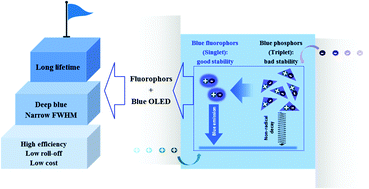Recent advances in high performance blue organic light-emitting diodes based on fluorescence emitters
Abstract
For the development of organic light-emitting diodes (OLEDs) and their application in the display and lighting fields, efficiency, stability and cost are the most important factors to be considered. In particular, the performance of blue materials is a key factor that influences the extent of OLED applications. Although blue phosphors with triplet emission can realize high efficiency, their bad stability and severe efficiency roll-off at high luminance greatly hinder their applications. Comparatively speaking, currently, blue fluorophores with singlet emission are still the best choice due to their advantages of long lifetime and low cost. This review mainly focuses on advances in high performance blue OLEDs based on fluorescence emitters from the perspective of mechanisms and device structures. Efficient methods to harvest triplets, molecular orientation effects and stability are discussed in detail. We also demonstrate future directions for the design of materials and device structures for high performance blue fluorescent OLEDs.

- This article is part of the themed collection: Journal of Materials Chemistry C Lunar New Year collection 2021


 Please wait while we load your content...
Please wait while we load your content...